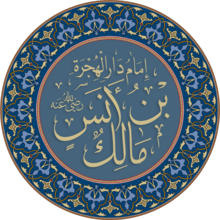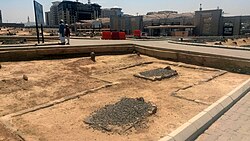| Revision as of 06:29, 30 October 2015 editRookTaker (talk | contribs)1,456 editsmNo edit summary← Previous edit | Revision as of 11:08, 30 October 2015 edit undoRookTaker (talk | contribs)1,456 edits →Textualist interpretation of God's attributes: As per the sourceNext edit → | ||
| Line 49: | Line 49: | ||
| ===Textualist interpretation of God's attributes=== | ===Textualist interpretation of God's attributes=== | ||
| Malik adhered to a ] or literal interpretation of Quran and hadith in relation to God's attributes. In reference to God's `sitting upon the throne` in the Quran (found in 7:54<ref name="cite quran|7|54|s=ns">{{cite quran|7|54|s=ns}}</ref> and 20:5<ref name="cite quran|20|5|s=ns">{{cite quran|20|5|s=ns}}</ref>), Malik is reported to have said:<ref name=Fakhry-xvii/> <blockquote>`The sitting is |
Malik adhered to a ] or literal interpretation of Quran and hadith in relation to God's attributes. In reference to God's `sitting upon the throne` in the Quran (found in 7:54<ref name="cite quran|7|54|s=ns">{{cite quran|7|54|s=ns}}</ref> and 20:5<ref name="cite quran|20|5|s=ns">{{cite quran|20|5|s=ns}}</ref>), Malik is reported to have said:<ref name=Fakhry-xvii/> <blockquote>`The sitting is given, its modality is unknown. Belief in it is an obligation and raising questions regarding it is a heresy ]'']`<ref name=Fakhry-xvii>{{cite book| last=Fakhry |first=Majid |edition=second |title=A History of Islamic Philosophy |publisher=Columbia University Press |location=New York |year=1983|page=xvii }}</ref><ref>Al-Shahrastani, '']'' p.17</ref></blockquote> | ||
| Al-Daraqutni relates that Malik was asked about the attributes of ], to which Malik answered, "Pass them on as they come."<ref>as-Siffat, pg.75</ref> Furthermore, ] relates that Malik was asked whether people would be looking toward ] given the narration, "And some faces shall be shining and radiant upon that day, looking at their Lord." Malik ensuingly answered, "Yes, with these two eyes of his," though his student replied, "There are a people who say he will not be looking at Allah, that 'looking' means a reward," to which Malik answered, "They lied, rather they will look at Allah." | Al-Daraqutni relates that Malik was asked about the attributes of ], to which Malik answered, "Pass them on as they come."<ref>as-Siffat, pg.75</ref> Furthermore, ] relates that Malik was asked whether people would be looking toward ] given the narration, "And some faces shall be shining and radiant upon that day, looking at their Lord." Malik ensuingly answered, "Yes, with these two eyes of his," though his student replied, "There are a people who say he will not be looking at Allah, that 'looking' means a reward," to which Malik answered, "They lied, rather they will look at Allah." | ||
Revision as of 11:08, 30 October 2015
Not to be confused with Anas ibn Malik.| Mālik ibn Anas | |
|---|---|
 Mālik ibn Anas ibn Mālik ibn Abī 'Āmir al-Asbahī with Islamic calligraphy Mālik ibn Anas ibn Mālik ibn Abī 'Āmir al-Asbahī with Islamic calligraphy | |
| Title | Imam of the Abode of Emigration |
| Personal life | |
| Born | 711 CE/93 AH Medina |
| Died | 795 CE/179 AH (aged 83-84) Medina |
| Era | Umayyad Caliphate |
| Region | Medina |
| Main interest(s) | Hadith, Fiqh |
| Notable idea(s) | Maliki madhhab |
| Notable work(s) | Al-Muwatta, Mudawana |
| Jurisprudence | Sunnah |
| Senior posting | |
| Influenced by | |
| Influenced | |
| Part of a series on Sunni Islam |
|---|
 |
| Beliefs |
| Five Pillars |
| Rightly-Guided Caliphs |
|
Schools of law
Others |
|
Schools of theology
In terms of Ihsan: |
| Contemporary movements |
| Holy sites |
| Lists |
|
|
Mālik ibn Anas ibn Mālik ibn Abī 'Āmir al-Asbahī (Arabic: مالك بن أنس; 711–795 CE / 93–179 AH) is known as "Imam Malik," the "Sheikh of Islam", the "Proof of the Community," and "Imam of the Abode of Emigration." He was one of the most highly respected scholars of fiqh in Sunni Islam. Shafi`i, who was one of Malik's students for nine years and a scholarly giant in his own right, stated, "when scholars are mentioned, Malik is the star." The Maliki Madhab/rite, named after Malik, is one of the four schools of jurisprudence that are followed by Sunni Muslims to this day. Imam Malik was a student of Imam Abu Hanifa and Imam Ja'far al-Sadiq.
Biography
His full name was Abu Abdullah Mālik ibn Anas ibn Mālik Ibn Abī 'Āmir Ibn 'Amr Ibnul-Hārith Ibn Ghaimān Ibn Khuthail Ibn 'Amr Ibnul-Haarith.
Malik was born the son of Anas ibn Malik (not the Sahabi) and Aaliyah bint Shurayk al-Azdiyya in Medina circa 711. His family was originally from the al-Asbahi tribe of Yemen, but his great grandfather Abu 'Amir relocated the family to Medina after converting to Islam in the second year of the Hijri calendar, or 623 CE. According to Al-Muwatta, he was tall, heavyset, imposing of stature, very fair, with white hair and beard but bald, with a huge beard and blue eyes.
Teachers
Living in Medina gave Malik access to some of the most learned minds of early Islam. He memorized the Quran in his youth, learning recitation from Abu Suhail Nafi' ibn 'Abd ar-Rahman, from whom he also received his Ijazah, or certification and permission to teach others. He studied under various famed scholars including Hisham ibn Urwah, Ibn Shihab al-Zuhri, and — along with Abu Hanifa, the founder of the Hanafi Sunni Madh'hab- and under the household of the Prophet's lineage, Jafar al Sadiq. This fact may explain the mutual respect and relative peace that has often existed between the Hanafi and Maliki Sunnis, on one hand, and the Shi`is on the other.
Golden Chain of Narration
Malik's chain of narrators was considered the most authentic and called Silsilat ul-Zhahab or "The Golden Chain of Narrators" by notable hadith scholars including Muhammad al-Bukhari. The 'Golden Chain' of narration (i.e., that considered by the scholars of Hadith to be the most authentic) consists of Malik, who narrated from Nafi', who narrated from Ibn Umar, who narrated from Muhammad.
Mention in Hadith
The Prophet Muhammad reportedly said in a hadith authenticated by Muhammad ibn `Isa at-Tirmidhi: “Very soon will people beat the flanks of camels in search of knowledge, and they shall find no-one more knowledgeable than the knowledgeable scholar of Madina.” Qadi Ayyad, Al-Dhahabi and others relate from Sufyan ibn `Uyaynah, ‘Abd ar-Razzaq as-San‘ani, Ibn Mahdi, Yahya ibn Ma'in, Dhu’ayb ibn `Imama, Ibn al-Madini, and others that they considered that scholar to be Malik ibn Anas.
Views
Reluctance in rendering religious verdicts
Malik took advantage of the fact that he was contemporary to many of the Tabi‘in to formulate his school of thought, which gave precedence to the acts of the people of Medina over the Hadith if they were in conflict. This was done due to the sizeable amount of scholars, and companions of Muhammad residing in the city where Malik's reputation grew immensely. Malik nevertheless showed hesitancy in issuing religious verdicts explaining in one of his more famous statements that:
The shield of the scholar is, 'I do not know,' so if he neglects it, his statement is attacked.
Textualist interpretation of God's attributes
Malik adhered to a textual or literal interpretation of Quran and hadith in relation to God's attributes. In reference to God's `sitting upon the throne` in the Quran (found in 7:54 and 20:5), Malik is reported to have said:
`The sitting is given, its modality is unknown. Belief in it is an obligation and raising questions regarding it is a heresy `
Al-Daraqutni relates that Malik was asked about the attributes of Allah, to which Malik answered, "Pass them on as they come." Furthermore, Qadi Iyad relates that Malik was asked whether people would be looking toward Allah given the narration, "And some faces shall be shining and radiant upon that day, looking at their Lord." Malik ensuingly answered, "Yes, with these two eyes of his," though his student replied, "There are a people who say he will not be looking at Allah, that 'looking' means a reward," to which Malik answered, "They lied, rather they will look at Allah."
Opposition to bid'ah or innovation in beliefs
Malik was vehemently opposed to bid'ah and even directed others not to extend the Islamic greeting of Salam to the people of bidah, stating, "How evil are the People of Innuendo, we do not give them felicitations." Malik explained that "he who establishes an innovation in Islam regarding it as something good, has claimed that Muhammad has betrayed his trust to deliver the message as Allah says, 'This day have I perfected for you your religion'. And whatsoever was not part of the religion then, is not part of the religion today."
Prohibiting Kalam
Malik sternly prohibited theological rhetoric and philosophical speech, frequently referred to as kalam. Malik believed that Kalam was rooted in heretical doctrines taken up and followed by controversial theologians such as Jahm bin Safwan. When asked about an individual who delved into Kalam, Malik answered, "He establishes his innuendo with kalaam, and if kalaam had been knowledge, the Companions and the tabi'in would have spoken about it, just as they spoke about the rules and regulations.
Death

Imam Malik died at the age of 84 in Medina in 795 and is buried in the famous Jannat ul-Baqi cemetery across from the Masjid al Nabawi. Malik's last words were related by one Isma'il Ibn Abi Uways who said, "Malik became sick, so I asked some of our people about what he said at the time of his death. They said, `He recited the shahadah (testification of faith), then he recited:
Their affair is for Allah, before and after.
Works
Imam Malik wrote:
- Al-Muwatta, "The Approved," which was said to have been regarded by Shafi'i to be the soundest book on Earth after the Qur'an.
- Al-Mudawwana al-Kubra, written down by Sahnun ibn Sa'id ibn Habib at-Tanukhi (c. 776-7 – 854-5) after the death of Malik ibn Anas.
Early Islamic scholars
| Early Islamic scholars | |||||||||||||||||||||||||||||||||||||||||||||||||||||||||||||||||||||||||||||||||||||||||||||||||||||||||||||||||||||||||||||||||||||||||||||||||||||||||||||||||||||||||||||||||||||||||||||||||||||||||||||||||||||||||||||||||||||||||||||||||||||||||||||||||||||||||||||||||||||||||||||||||||||||||||||||||||||||||||||||||||||||||||||||||||||||||||||||||||||||||||||||||||||||||||||||||||||||||||||||||||||||||||||||||||||||||||||||||||||||||||||||||||||||||||||||||||||||||||||||||||||||||||||||||||||||||||||||||||||||||||||||||||||||||||||||||||||||||||||||||||||||||||||||||||||||||||||||||||||||||||||||||||||||||||||||||||||||||||||||||||||||||||||||||||||||||||||||||||||||||||||||||||||||||||||||||||||||||||||||||||||||||||||||||||||||||||||||||||||||||||||||||||||||||||||||||||||||||||||||||||||||||||||||||||||||||||||||||||||||||||||||||||||||||||||||||||||||||||||||||||||||||||||||||||||||||||||||||||
|---|---|---|---|---|---|---|---|---|---|---|---|---|---|---|---|---|---|---|---|---|---|---|---|---|---|---|---|---|---|---|---|---|---|---|---|---|---|---|---|---|---|---|---|---|---|---|---|---|---|---|---|---|---|---|---|---|---|---|---|---|---|---|---|---|---|---|---|---|---|---|---|---|---|---|---|---|---|---|---|---|---|---|---|---|---|---|---|---|---|---|---|---|---|---|---|---|---|---|---|---|---|---|---|---|---|---|---|---|---|---|---|---|---|---|---|---|---|---|---|---|---|---|---|---|---|---|---|---|---|---|---|---|---|---|---|---|---|---|---|---|---|---|---|---|---|---|---|---|---|---|---|---|---|---|---|---|---|---|---|---|---|---|---|---|---|---|---|---|---|---|---|---|---|---|---|---|---|---|---|---|---|---|---|---|---|---|---|---|---|---|---|---|---|---|---|---|---|---|---|---|---|---|---|---|---|---|---|---|---|---|---|---|---|---|---|---|---|---|---|---|---|---|---|---|---|---|---|---|---|---|---|---|---|---|---|---|---|---|---|---|---|---|---|---|---|---|---|---|---|---|---|---|---|---|---|---|---|---|---|---|---|---|---|---|---|---|---|---|---|---|---|---|---|---|---|---|---|---|---|---|---|---|---|---|---|---|---|---|---|---|---|---|---|---|---|---|---|---|---|---|---|---|---|---|---|---|---|---|---|---|---|---|---|---|---|---|---|---|---|---|---|---|---|---|---|---|---|---|---|---|---|---|---|---|---|---|---|---|---|---|---|---|---|---|---|---|---|---|---|---|---|---|---|---|---|---|---|---|---|---|---|---|---|---|---|---|---|---|---|---|---|---|---|---|---|---|---|---|---|---|---|---|---|---|---|---|---|---|---|---|---|---|---|---|---|---|---|---|---|---|---|---|---|---|---|---|---|---|---|---|---|---|---|---|---|---|---|---|---|---|---|---|---|---|---|---|---|---|---|---|---|---|---|---|---|---|---|---|---|---|---|---|---|---|---|---|---|---|---|---|---|---|---|---|---|---|---|---|---|---|---|---|---|---|---|---|---|---|---|---|---|---|---|---|---|---|---|---|---|---|---|---|---|---|---|---|---|---|---|---|---|---|---|---|---|---|---|---|---|---|---|---|---|---|---|---|---|---|---|---|---|---|---|---|---|---|---|---|---|---|---|---|---|---|---|---|---|---|---|---|---|---|---|---|---|---|---|---|---|---|---|---|---|---|---|---|---|---|---|---|---|---|---|---|---|---|---|---|---|---|---|---|---|---|---|---|---|---|---|---|---|---|---|---|---|---|---|---|---|---|---|---|---|---|---|---|---|---|---|---|---|---|---|---|---|---|---|---|---|---|---|---|---|---|---|---|---|---|---|---|---|---|---|---|---|---|---|---|---|---|---|---|---|---|---|---|---|---|---|---|---|---|---|---|---|---|---|---|---|---|---|---|---|---|---|---|---|---|---|---|---|---|---|---|---|---|---|---|---|---|---|---|---|---|---|---|---|---|---|---|---|---|---|---|---|---|---|---|---|---|---|---|---|---|---|---|---|---|---|---|---|---|---|---|---|---|---|---|---|---|---|---|---|---|---|---|---|---|---|---|---|---|---|---|---|---|---|---|---|---|---|---|---|---|---|---|---|---|---|---|---|---|---|---|---|---|---|---|---|---|---|---|---|---|---|---|---|---|---|---|---|---|---|---|---|---|---|---|---|---|---|---|---|---|---|---|---|---|---|---|---|---|---|---|---|---|---|---|---|---|---|---|---|---|---|---|---|---|---|---|---|---|---|---|---|---|---|---|---|---|---|---|---|---|---|---|---|---|---|---|---|---|---|---|---|---|---|---|---|---|---|---|---|---|---|---|---|---|---|---|---|---|---|---|---|---|---|---|---|---|---|---|---|---|---|---|---|---|---|---|---|---|---|---|---|---|---|---|---|---|---|---|---|---|---|---|---|---|---|---|---|---|---|---|---|---|---|---|---|---|---|---|---|---|---|---|---|---|---|---|---|---|---|---|---|---|---|---|---|---|---|---|---|---|---|---|---|---|---|---|---|---|---|---|---|
| |||||||||||||||||||||||||||||||||||||||||||||||||||||||||||||||||||||||||||||||||||||||||||||||||||||||||||||||||||||||||||||||||||||||||||||||||||||||||||||||||||||||||||||||||||||||||||||||||||||||||||||||||||||||||||||||||||||||||||||||||||||||||||||||||||||||||||||||||||||||||||||||||||||||||||||||||||||||||||||||||||||||||||||||||||||||||||||||||||||||||||||||||||||||||||||||||||||||||||||||||||||||||||||||||||||||||||||||||||||||||||||||||||||||||||||||||||||||||||||||||||||||||||||||||||||||||||||||||||||||||||||||||||||||||||||||||||||||||||||||||||||||||||||||||||||||||||||||||||||||||||||||||||||||||||||||||||||||||||||||||||||||||||||||||||||||||||||||||||||||||||||||||||||||||||||||||||||||||||||||||||||||||||||||||||||||||||||||||||||||||||||||||||||||||||||||||||||||||||||||||||||||||||||||||||||||||||||||||||||||||||||||||||||||||||||||||||||||||||||||||||||||||||||||||||||||||||||||||||
See also
References
- ^ "Malik ibn Anas ibn Malik ibn `Amr, al-Imam, Abu `Abd Allah al-Humyari al-Asbahi al-Madani". Sunnah.org. Retrieved 2010-04-10.
- "The Life and Times of Malik ibn Anas". Islaam.Com. Retrieved 2010-04-10.
- "– Topics". Muslimheritage.com. 2005-01-04. Retrieved 2010-04-10.
- ""Imaam Maalik ibn Anas" by Hassan Ahmad, '''Al Jumuah' Magazine'' Volume 11 – Issue 9". Sunnahonline.com. Retrieved 2010-04-10.
- http://eshaykh.com/hadith/hadith-abour-imam-malik-r/
- Al-Intiqaa, pg. 38
- Quran 7:54
- Quran 20:5
- ^ Fakhry, Majid (1983). A History of Islamic Philosophy (second ed.). New York: Columbia University Press. p. xvii.
- Al-Shahrastani, Al-Milal wa al-Nihal p.17
- as-Siffat, pg.75
- al-Ibaanah of ibn Battah, no.441
- al-I'tisaam
- Dhammul-Kalaam (qaaf/173/alif)
- Jaami' Bayaanul-Ilm wa Fadlihi (p. 415)
- Dhammul-Kalaam (qaaf/173/baa)
- Quran 30:4
External links
- Life of Imam Malik
- Biography of Imam Malik at Lost Islamic History
- Biography of Imam Malik
- A comprehensive Biography of Imam Malik
- Al-Muwatta' of Imam Malik
- Muslims of Norwich A Maliki community
- Template:Fr The lifestyle of Imâm Mâlik Ibn Anas (at-tawhid.net)
- Malik, Imam B Anas مَالِك بن أنس ; A complete biography on Imam Malik bin Anas
| Muslim scholars of the Maliki school | ||
|---|---|---|
| 2nd/8th |
|  |
| 3rd/9th |
| |
| 4th/10th |
| |
| 5th/11th |
| |
| 6th/12th |
| |
| 7th/13th |
| |
| 8th/14th |
| |
| 9th/15th |
| |
| 10th/16th |
| |
| 11th/17th |
| |
| 12th/18th |
| |
| 13th/19th |
| |
| 14th/20th |
| |
| 15th/21st |
| |
| Scholars of other Sunni Islamic schools of jurisprudence | ||